“I love this very aggressive music.” That’s what a voice claims at the end of the titular opening track on the new Angel Du$t record, Brand New Soul. The assertion comes from a man on the street outside the Baltimore hardcore band’s jam space—the band was chatting with him one night and captured the soundbite. He has the air of someone who’s maybe hearing hardcore-punk music for the first time, but doesn’t quite know how to describe it. To the average listener, “aggressive” is the first and most frequently used descriptor for heavy music.
But Brand New Soul is more playful than it is aggressive. It’s rowdy and crackling with energy, absolutely, but rarely is it aggressive in the contemporary hardcore sense. Rather than any particular look or sound, the record is about the subversive ethic and steely guts of aggression. And for Angel Du$t, rock ’n’ roll was the first aggressive music. “I think people get really focused on playing a specific subgenre, and I think they lose the importance of what makes rock ’n’ roll significant,” says frontman Justice Tripp. “It’s what you see in the origin of rhythm and blues music and early rock ’n’ roll, which is the soul and the spirit of it.”
Angel Du$t - "Brand New Soul"
Brand New Soul is militantly creative to the point that it often feels altogether untethered from anything resembling genre, industry, or cultural guidelines. Occasionally, it feels like a TikTok speedrun through every alternative and underground rock-adjacent sound of the past 70 years. The thumping sprint of lead single “Racecar” is led by acoustic guitar strumming and flowery woodwind synths. Acoustic also leads the way on “Don’t Stop,” a funky, ’90s-alt-rock-radio chug, and “Born 2 Run,” a swooning gutter-pop dreamscape. When the album closes on “In the Tape Deck,” it’s on a floating, beachy wave of synths and steel-string strumming, drifting out to sea. Over 13 tracks, the record darts between these moods and auras, stitched together with wonky samples, warped voice recordings, and fragmented, distorted notes.
This all plays into what Tripp is saying about genre dogma—that planting yourself in any one spot and boxing out everything else is anathema to real rebellion, real artistry. “When you get really hyper-focused on, ‘We’re playing this specific niche of hardcore punk-rock music,’ you set boundaries for yourself that don’t allow for exploration and true self-expression, you know?” he continues.
“I think people get really focused on playing a specific subgenre, and I think they lose the importance of what makes rock ’n’ roll significant.” —Justice Tripp
Tripp has earned this wisdom over decades. He came up in Baltimore’s hardcore scene, and fronted the iconic hardcore outfit Trapped Under Ice beginning in 2007. That band was celebrated in hardcore circles around the world, and it was also a sign of things to come. Trapped Under Ice’s drummer, Brendan Yates, went on to front Turnstile, the Grammy-nominated band at the head of hardcore’s new wave. (Fellow Turnstile members Daniel Fang and Pat McCrory served as Angel Du$t’s original drummer and guitarist, respectively.)
Angel Du$t's Gear
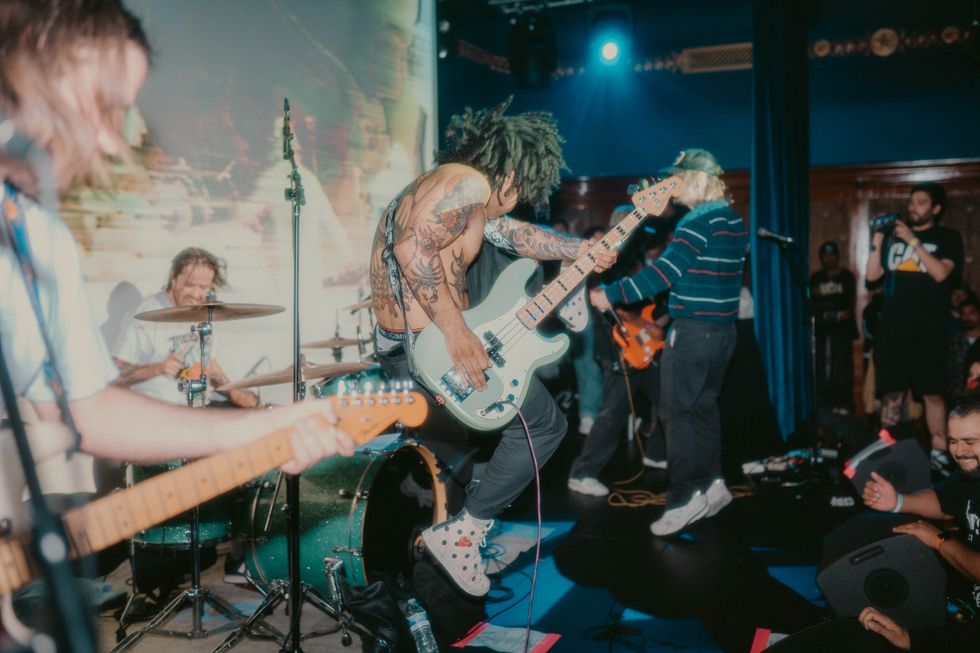
Zechariah Ghostribe gets some air while Steve Marino riffs, just out of focus, in the foreground.
Photo by Kat Nijmeddin
Guitars & Basses
- Fender CC-60SCE
- Taylor 810ce
- Fender American Performer Stratocaster
- Fender Cabronita Telecaster with TV Jones Power’Tron pickups
- Fender MIJ Telecaster with JBE pickups
- Charvel Pro-Mod DK24 HSH
- 1975 Gibson SG
- 2009 Gibson Les Paul Studio
- Gretsch G6659TG Players Edition Broadkaster Jr.
- Fender Jazz Bass
- Fender Precision Bass
Amps
- 1976 Marshall JMP 2203
- 1977 Roland JC-120 Jazz Chorus
- 1957 Fender 5F10 Harvard
- Gibson GA-19RVT Falcon
- Sound City Concord
- Gretsch 6161
- Fender Vibrasonic
- Ampeg SVT
Effects
- Boss CE-1 Chorus Ensemble
- Roland RE-201 Space Echo Tape Delay
- Custom pedals made by engineer Paul Mercer
- Various Electro-Harmonix Big Muffs, ZVEX Effects, JHS, and Barber Pedals
Angel Du$t has been marked by transience, making it something of a revolving door of East Coast musicians joining Justice Tripp on his mission to make hardcore’s weirdest music. With the launch of their newest record, the band has debuted a new lineup, too, with Steve Marino and Daniel Star on guitars, Zechariah Ghostribe on bass, and Tommy Cantwell on drums. And even though it initially sprang from (and still belongs to) Maryland’s hallowed hardcore communities, Angel Du$t has been angling for something a little different from the start, and its new players each bring fresh perspective to the project.
“Some of us come from playing metal stuff, and some of us play blues and jazz and rock,” says rhythm guitarist Marino. “I think for most people, [Angel Du$t] is hardcore adjacent, but I was a fan a long time before I joined, and what I liked about the band was that it didn’t really fit into one specific lane.”
“If it doesn’t sound cool or good or interesting on an acoustic, it doesn’t matter what it sounds like when I plug it in.” —Daniel Star
The influences that fit into Brand New Soul—the title is a wink to updating and reworking music history—are as sprawling and original as the record itself. Tripp’s writing for the album was colored by records from Prince, Iggy Pop, and David Bowie, and Star brought pieces from Bad Brains and Dinosaur Jr. Marino, meanwhile, kept Neil Young at front of mind. The LP’s acoustic-forward character is in part a product of what Tripp describes as a deeply held “spiritual belief” in acoustics and their power, regardless of genre. “People associate them with folk music and weak-ass tracks, but a lot of artists like the Stooges, the Wipers, Greg Sage’s solo music, Blur, and the Feelies all used [an acoustic] as a percussive instrument and kind of pushed the boundaries of how aggressively it can be used,” says Tripp. “It’s been our mission statement as long as we’ve been a band to try to see how far we can do that without sounding ridiculous.”
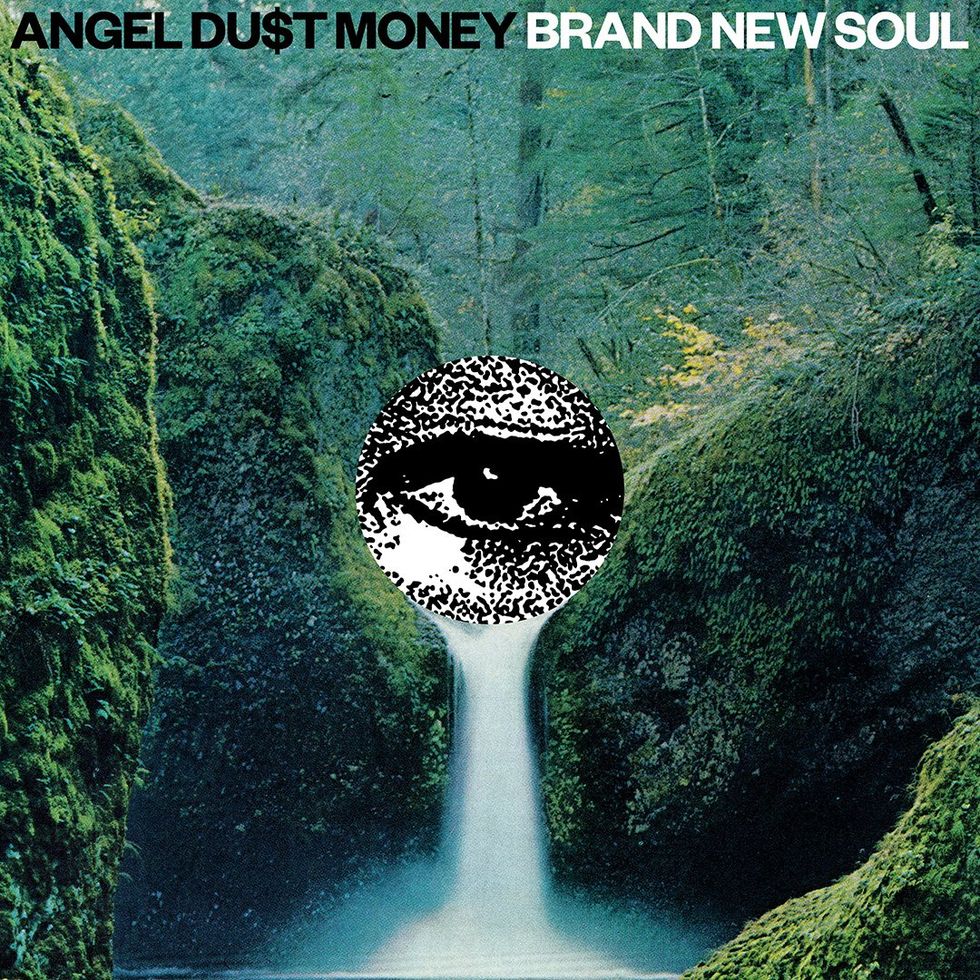
Angel Du$t’s new record isn’t “aggressive” in the sense one might expect from a hardcore band.
Star agrees. He often thinks about a Tom Morello interview, where the Rage Against the Machine guitarist professed that every riff he brought to the band was conceived and written on an acoustic. “Since then, I’ve pretty much thought that if it doesn’t sound cool or good or interesting on an acoustic, it doesn’t matter what it sounds like when I plug it in,” says Star.
Marino’s background is in solo singer-songwriter music, so relying on the acoustic comes naturally. Double-tracking and hard-panning an acoustic on record is one of his favorite techniques. “I feel like young kids who like heavy music need to be told that acoustic instruments are cool, and it’s not just all about heavy riffs,” he says.
Angel Du$t’s ambitions for artistic fulfillment have earned them respect, but they’ve also drawn anger from punk purists who feel Tripp and the project have betrayed what hardcore is all about. The chief sticking points are usually with melody and aesthetic—Angel Du$t songs often feel on the surface like a DIY-ish version of power pop, and they don’t typically crush the senses with saturated, heavy riffs or blast-beat drums. “I think when Angel Du$t started, there were people who had a perception of me being a tough guy making the most heavy music imaginable, which has never been who I am but a thing I like to do, I like heavy music,” Tripp explains. “So introducing melody and musical things was offensive to that identity, the strict hardcore-punk fans. ‘If you’re not doing exactly that, then we can’t be friends,’ was how a lot of people saw it.
“Everything we do musically is experimental and challenging,” he continues. “Music is a thing that brings people together, you know? But I just think there’s some individuals who miss the point of what music is.”
“I feel like young kids who like heavy music need to be told that acoustic instruments are cool, and it’s not just all about heavy riffs.” —Steve Marino
Star half jokes that he’s hard-pressed to think of a more “inclusive” and welcoming record than their latest. “Maybe I’m biased, but I don’t think I’ve ever heard a record where there’s literally something for every kind of music fan,” he says. “If you don’t wanna hear something super heavy, we got soft tracks. We have awesome funky stuff, we got rap tracks.” Marino admits there were some red lines—an acoustic guitar and double-kick-drum breakdown was nixed from one track. “What could be more inclusive than a double kick with an acoustic?” asks Tripp.
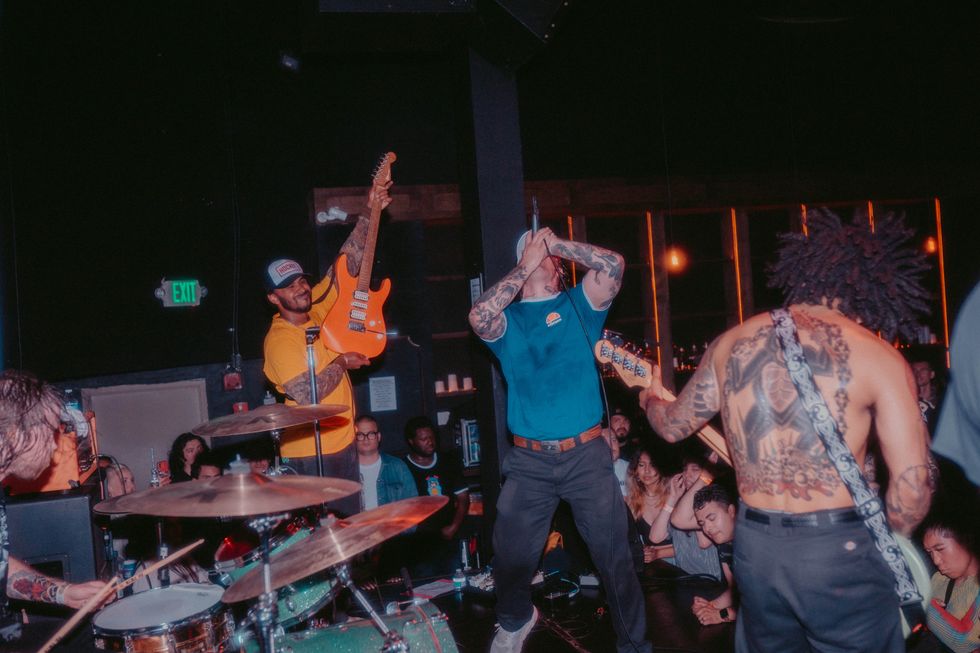
Daniel Star lifts his orange Strat-style shredder aloft. The guitarist is inspired by Rage Against the Machine’s Tom Morello, who once said in an interview that he wrote all of his riffs on acoustic guitar.
Photo by Kat Nijmeddin
Brand New Soul’s outsider punk came to life at Wright Way Studios in Baltimore, with Tripp producing for the first time. Over years of working with vets like Rob Schnapf, he picked up tricks for executing acoustics, samples, loops, and other ephemera in the contexts of “aggressive” music. At times, Tripp would cook up an idea that he couldn’t pull off, but Star or Marino would have the know-how to bring it to life thanks to their varied backgrounds.
Marino says that on previous records he’s made, he’s typically cornered a guitar tone that’s been used on the whole record, but this time out, each song was treated like a blank slate. Engineer Paul Mercer, who builds and mods gear, brought a collection of amps, guitars, pedals, and farther-flung toys to Wright Way. Star and drummer Cantwell actually slept at Wright Way for two weeks while cutting the record, so they embedded themselves in Mercer’s playland. “He had like an old ’50s amp that he put some crazy fuzz that he built onto, and it was giving these sounds that some of us had never heard,” says Star. “I feel like being so physically immersed in that, and so many decades of technology, was able to bring so many more things out of me that I don’t think I would’ve been able to tap into otherwise. It was a very new and mind-altering thing for me.”
“What I liked about the band was that it didn’t really fit into one specific lane.” —Steve Marino
“You say, ‘Hey, I’m looking for a unique sound here,’ and Paul has a fuckin’ billion guitar pedals and amps that he built or rebuilt or altered that have really cool sounds,” adds Tripp. Marino notes that they put all six of Mercer’s Telecasters, and nearly each of his 15 guitars total, to use. It’s testament to Tripp’s production and Mercer’s engineering that all of these sounds—guitar or otherwise—flow seamlessly and feel cut from the same cloth, even as they ricochet through aesthetics. The brutal pound of “Sippin’ Lysol” collapses into the weirdo indie of “I’m Not Ready,” which in turn gives way to the hyper, upbeat Lemonheads-esque riffing of “Fuel for the Fire,” after which comes a gnarly, enraged cover of the Coneheads’ “Waste of Space.”
Eight tracks in, “Very Aggressive” circles back to the cheeky invocation of “aggressive music,” with a straight-forward steam-engine punk churn featuring Citizen’s Mat Kerekes. It drops to a crawl on the bridge, then the tempo skyrockets back to normal as Tripp bellows, “The sound is offensive to me / Very aggressive, indeed!” On its face, the song is about Tripp’s issue with the idea that aggression only takes one specific form. “You can do a lot to hurt somebody without going up and whoopin’ their ass. In some cases, I’d rather get my ass whooped than some of the alternatives,” says Tripp. “Lyrically, that song is most literally about a passive-aggressive person in your life who sees themself as the good guy, doing things that hurt people but having a way out of it because they can play that role of being peaceful or calm. I think that’s very aggressive behavior.”
But Tripp says the track doubles as a comment on “heavy music” itself and Angel Du$t’s haters. “It’s a statement of being like, ‘This is very aggressive music, even though it’s produced and musical and has acoustic guitars and melodies,’” he says. “It’s a moment to say, ‘Let’s not forget that this is hardcore punk music, it’s aggressive, it’s meant for people to jump off a stage to it.’”
YouTube It
Angel Du$t rip a typically fun and furious set in Jakarta in October 2023.


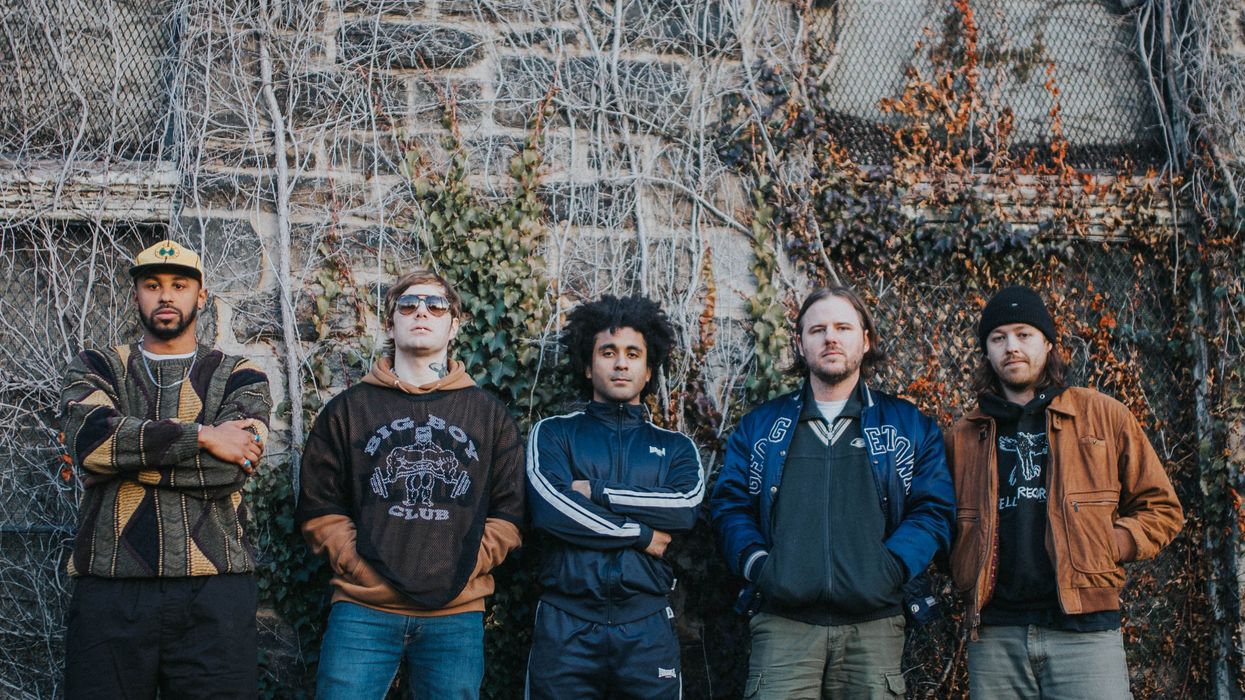








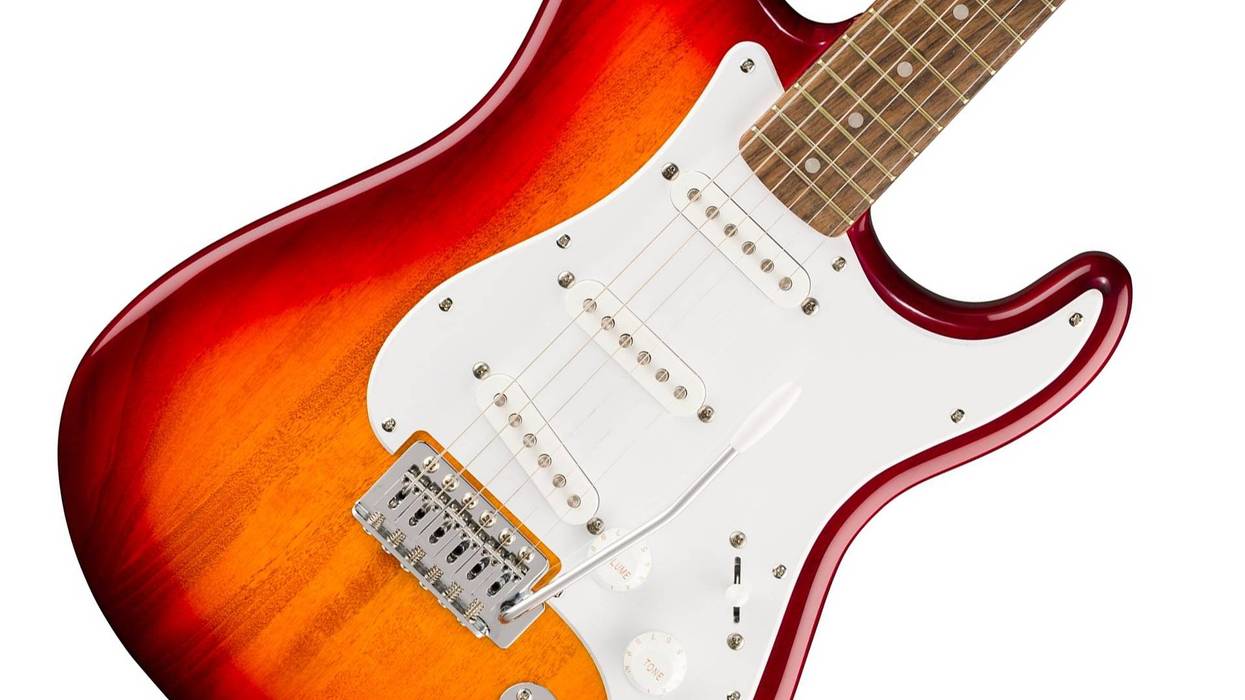
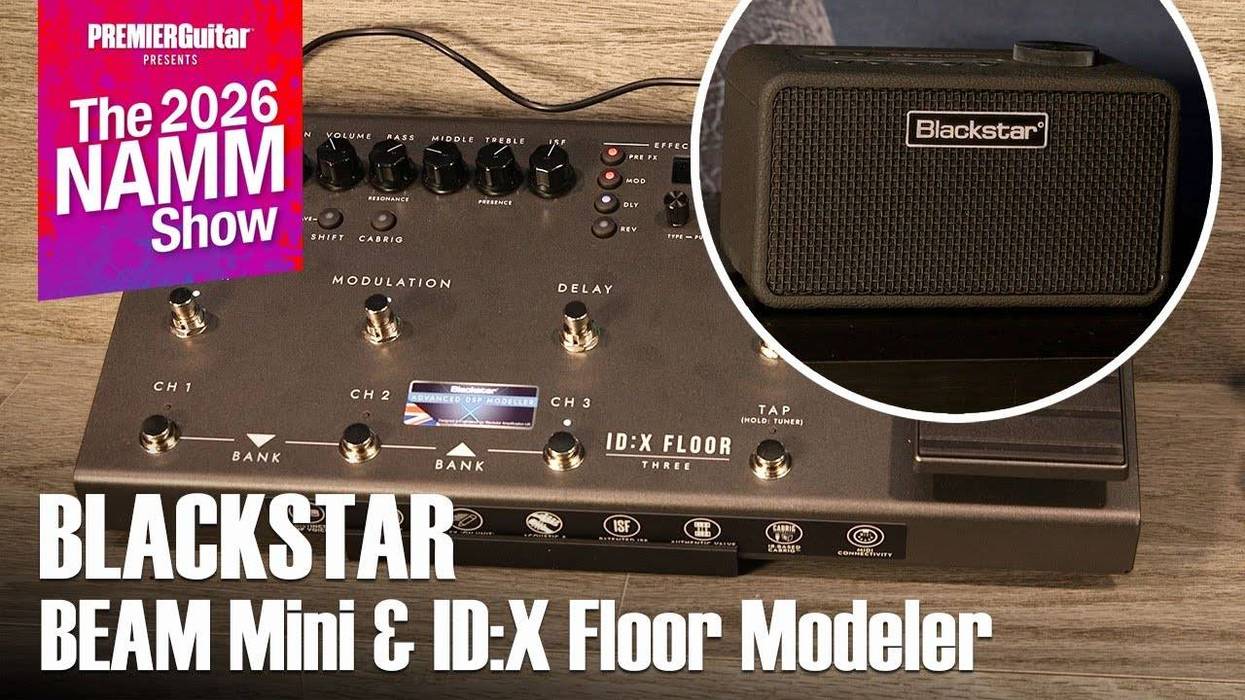
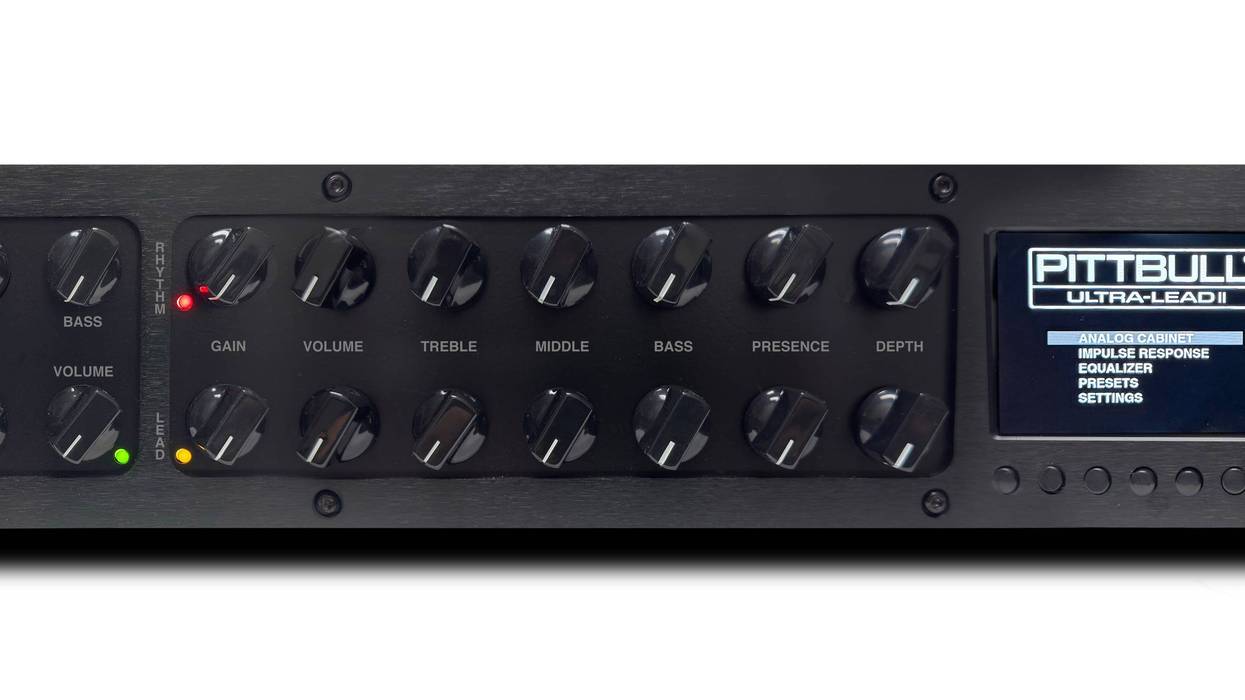

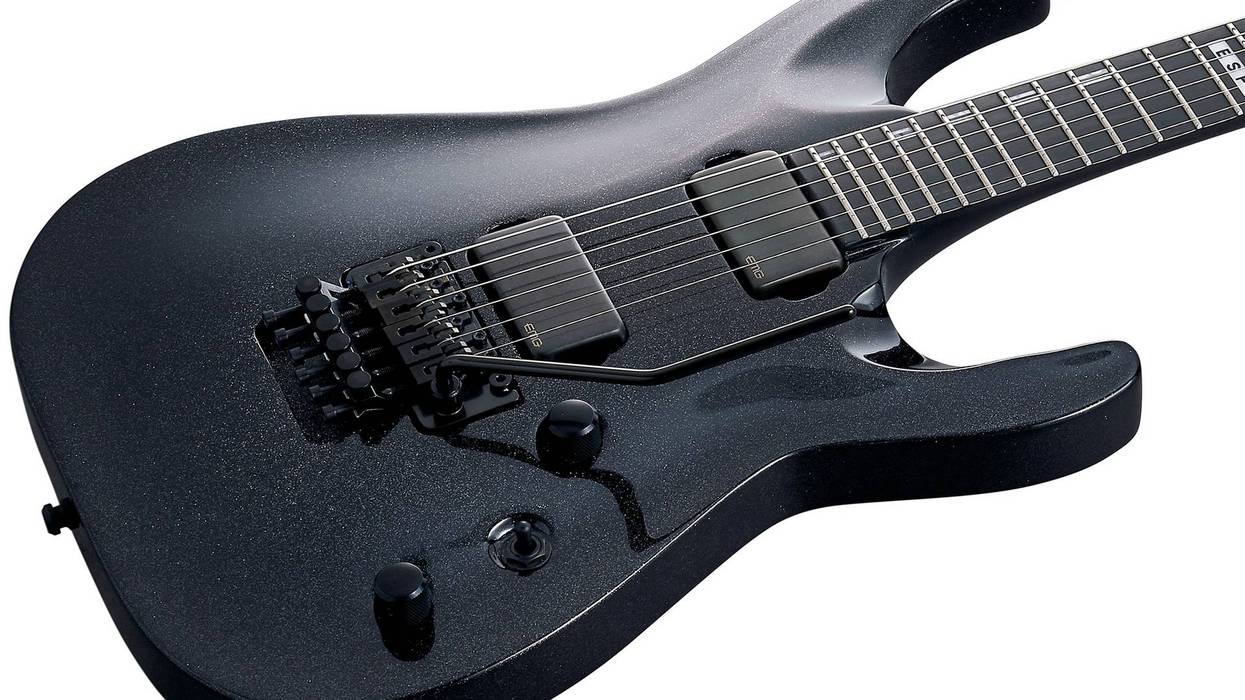
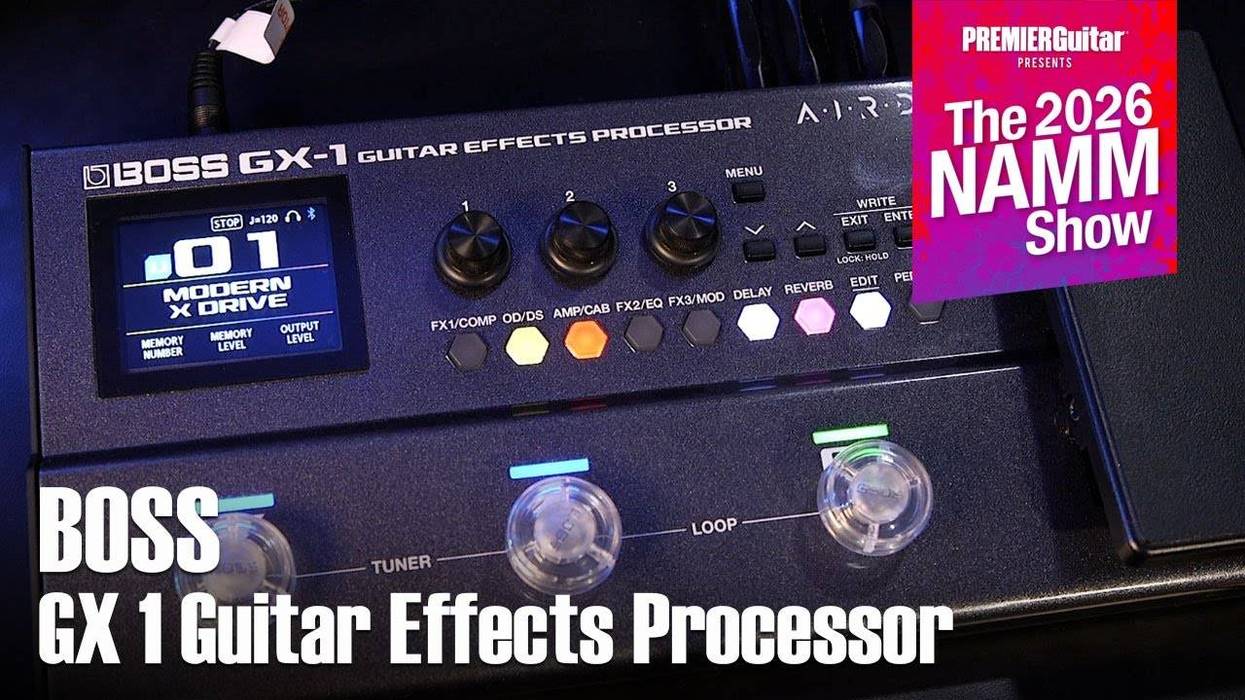



![Rig Rundown: Russian Circles’ Mike Sullivan [2025]](https://www.premierguitar.com/media-library/youtube.jpg?id=62303631&width=1245&height=700&quality=70&coordinates=0%2C0%2C0%2C0)






